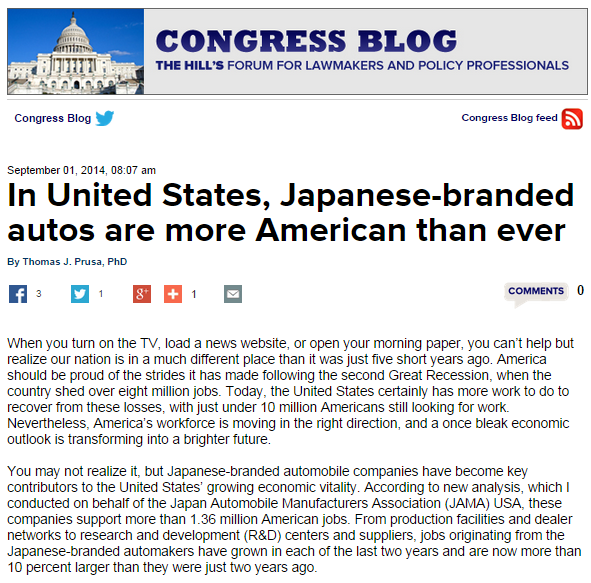By: Thomas J. Prusa, PhD
September 1, 2014
When you turn on the TV, load a news website, or open your morning paper, you can’t help but realize our nation is in a much different place than it was just five short years ago. America should be proud of the strides it has made following the second Great Recession, when the country shed over eight million jobs. Today, the United States certainly has more work to do to recover from these losses, with just under 10 million Americans still looking for work. Nevertheless, America’s workforce is moving in the right direction, and a once bleak economic outlook is transforming into a brighter future.
You may not realize it, but Japanese-branded automobile companies have become key contributors to the United States’ growing economic vitality. According to new analysis, which I conducted on behalf of the Japan Automobile Manufacturers Association (JAMA) USA, these companies support more than 1.36 million American jobs. From production facilities and dealer networks to research and development (R&D) centers and suppliers, jobs originating from the Japanese-branded automakers have grown in each of the last two years and are now more than 10 percent larger than they were just two years ago.
This new analysis reveals that Japanese-branded automobile companies are taking a new approach and are playing an increasingly larger role in communities across America. Currently, they have 26 manufacturing facilities and 36 R&D and design centers located right here in our back yard, providing economic benefits to the surrounding communities. By 2013, Japanese automakers made cumulative investments of more than $40 billion, up $5 billion from the previous year, to compete on a greater scale and play an even larger role in improving the American economy. Given this level of investment in America, it should come as no surprise that 70 percent of Japanese-branded automobiles sold in the United States are made in North America.
My new analysis referred to above offers a detailed snapshot of the specific jobs numbers behind this unprecedented level of Japanese automobile industry investment in America. It illustrates that in 2013, Japanese-branded automakers directly employed 82,816 workers. Their manufacturing activities also generated or supported an estimated 224,000 intermediate jobs (suppliers of goods and services), with another 393,000 jobs resulting from consumer spending by those in the direct and intermediate positions – totaling close to 700,000 jobs.
Likewise, Japanese-branded new vehicle dealers’ direct and intermediate employment totaled 423,568 in 2013, with 319,568 resulting from direct employment and 104,000 resulting from intermediate employment. Another 240,000 jobs were spinoffs from the direct and intermediate workers’ consumer spending, totaling more than 663,000 jobs tied to dealerships.
All told, production and new vehicle dealers provided $85.1 billion in total employee compensation and $63 billion in disposable income in 2013. These figures illustrate the activities of an industry that continues to evolve and a network of Japanese-branded automakers and related businesses that are providing new jobs, high-quality vehicles, and positively impacting local communities all across the United States.
The continued investments and contributions from Japanese-branded automakers, transform what have long been considered foreign-branded automobiles into U.S.-made goods, making them more American than ever and bringing countless jobs and economic activity to regions all across the U.S. along the way.
Thomas Prusa is a Professor of Economics at Rutgers University, New Brunswick, New Jersey and also a Research Associate of the National Bureau of Economic Research, Cambridge, Massachusetts. He received his PhD from Stanford University. He has published over 50 articles in leading journals and books. Professor Prusa has lectured in conferences and seminars to the World Trade Organization, European Union, the World Bank, the Federal Reserve, the World Trade Institute, the CATO Institute, the American Enterprise Institute, United Nations, Stanford University, Princeton University, New York University and many others. Professor Prusa has provided expert testimony before the U.S. International Trade Commission on many occasions.
Original Source: The Hill
Click to view PDF:


